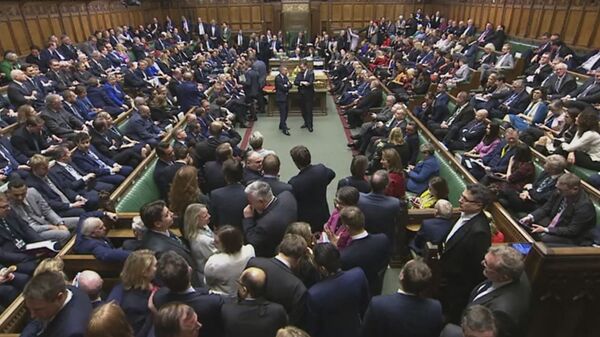In a demonstration of Boris Johnson’s newly-won thumping power since winning a decisive victory in the 12 December general election, the Conservative Prime Minister’s Brexit deal cleared its first Parliamentary hurdle on Friday.
The UK House of Commons voted 358 to 234 in favour of the government’s EU Withdrawal Agreement Bill, as Johnson called for unity to deliver on his pledge to take the country out of the European Union on 31 January.
“Now is the time to act together as one reinvigorated nation, one United Kingdom, filled with renewed confidence in our national destiny, and determined at last to take advantage of the opportunities that now lie before us,” he said, opening the debate.
Breaking the Gridlock
It isn’t all that surprising that Johnson has finally broken through the gridlock that dominated UK politics since the 2016 referendum, getting his withdrawal deal through Parliament, said Chris Stafford, a doctoral researcher at the University of Nottingham in the Politics and International Relations Department, elaborating:
“Unlike when he first came to office, he now has a large majority in the House of Commons and has removed the more moderate and pro-European MPs who may have voted against him from the party. He has also won the support of the Eurosceptic wing of the Conservative party who, along with himself, shoulder a large part of the blame for preventing ex-prime Minister Theresa May from getting the withdrawal deal through Parliament.”
‘Controversial Divorce Deal’
Boris Johnson’s previous Brexit deal had been narrowly approved by the Commons in October, however, a government proposal to rush the bill through its remaining stages in just three days was voted down, prompting the Prime Minister to call a snap general election in the hopes of winning a much-needed Commons majority. Since then, the bill has been amended.
The Withdrawal deal is of course controversial, believes Chris Stafford, pointing out that despite the Tory election triumph on promises to get the UK out of the EU, the country is “still very much divided over the issue of Brexit”.
The Withdrawal Agreement is not a full “deal”, warns Professor Alex de Ruyter, Director of the Centre for Brexit Studies at Birmingham City University.
It tackles, says the Professor, a narrow set of issues necessary for the UK to leave the EU, such as the UK’s (and the EU’s) financial obligations as a result of being a member, certain guarantees for the citizens on both sides and a special status for Northern Ireland to prevent a hard border on the island of Ireland.
The Professor points out:
“It does not deal with anything to do with the future. This is like a divorce that doesn’t deal with who will have custody of the children!”
‘No Room for Manoeuvre’
Regarding the several amendments made to the Bill, Dr. Chris Stafford singles out the removal of a clause that strengthened workers’ rights and reduced the opportunity for Parliamentary scrutiny of the Brexit process.
As to the fact, the revised bill also legally prohibits any further extension to the withdrawal process, signifying that the UK will leave the EU regardless of whether it has a trade deal, Dr. Stafford said:
“While likely to help Johnson in the short-term, pandering to Brexit supporting voters, in the future it could back him into a corner with no room for manoeuvre. That said, Johnson has proven adept at shifting blame and escaping situations that would sink other politicians.”
More ‘Uncertainty’ Ahead
Ratification of the withdrawal agreement will continue after Christmas, following which, believes Professor Alex de Ruyter, negotiations on the future relationship will begin in earnest, adding:
“Once again, we can expect a great deal of noise from the Government in order to reassure its domestic (Brexiter) supporters. In reality, the UK will face at least another year of uncertainty, before the contours of the future relationship become apparent.”
After its ratification, the withdrawal agreement will be voted on by the House of Lords, and move on to receive Royal Assent from Buckingham Palace.
Under the Brexit bill, the UK will formally complete its withdrawal from the EU at the end of January, and reach a trade agreement with Brussels by the end of 2020.
During the transition period, the UK will continue to remain a de facto member of the political and economic bloc.




